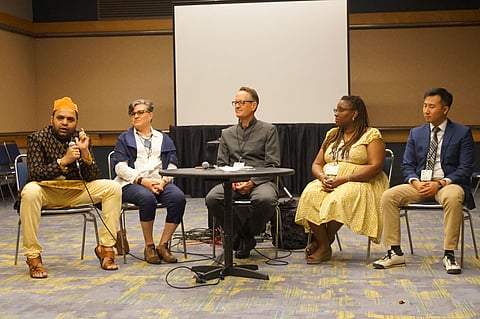
Chicago— In a compelling speech delivered at the Parliament of World’s Religions 2023, held at the same location where Swami Vivekananda once spoke, Dr. Obed Manwatkar, Professor of World Religions and Cultures at North Park University, Chicago, USA, shared a captivating narrative that exemplified the power of interfaith harmony in conflict resolution. \
Dr. Manwatkar's speech centered on the remarkable story of Nagpur, his hometown in India, and the historic interfaith peace and reconciliation commission initiated by spiritual leaders that continues to reverberate across boundaries.
Nagpur, a city located in the heart of India, stands as a testament to the diversity and coexistence of various faiths. With the presence of central offices of numerous world religions, including Zoroastrianism, Jainism, Buddhism, Sikhism, and various Christian denominations, Nagpur thrives as a melting pot of cultures, beliefs, and ideologies.
Dr Manwatkar said, "Most of the world’s religions central offices are located in Nagpur. There is Zoroastrianism, There were four Jewish Families but they moved to Mumbai and some to Israel but Zoroastrianism, we have Jainism both of the denominations Shwetambar or Digambar. We have Buddhism that is historic because one of our hero Dr. Ambedkar embraced Buddhism on 14th October 1956 with 600,000 of his followers so that’s world’s largest conversion ever happened in human history. That place is Deeksha bhoomi so Buddhism’s Headquarters is there. We have National Council for churches in India. It’s a gathering of most of the churches in India and of course there is Gurudwara Singh Sabha and there are Sufi shrines of Muslims. So, in total it’s all a mixed culture I grew up and Nagpur has been. when there are so many religions."
Dr. Manwatkar began his discourse by highlighting the visionary work of Rashtrasant Tukdoji Maharaj, a saint and social reformer who founded the Gurudev Seva Mandal in 1967. This monotheistic movement aimed at uniting people from different religious backgrounds under a common purpose - the welfare of Indian villages. Rashtrasant Tukdoji Maharaj's Gramgeeta, often referred to as the 'Geeta of the Villager,' was a literary endeavor that intertwined teachings from various world religions, promoting compassion, humanity, and communal harmony.
The turning point in Nagpur's history, however, arrived during a dark chapter in 1967 when communal clashes between Buddhists and Muslims resulted in tragic loss of life. Lying in a hospital bed, Rashtrasant Tukdoji Maharaj was informed of the brutal violence that unfolded. Responding to the crisis, he convened an interfaith meeting, inviting prominent religious figures including Padmabhushan Maulana Abdul Karim Parekh, Bhadant Anand Kausalyan, Archbishop D’ Souza, and Bhai Gyanendra Singh, among others.
During this gathering, which was marked by a 20-minute sermon that remains archived in All India Radio, Rashtrasant Tukdoji Maharaj passionately appealed for unity and interfaith prayer. He questioned the dissonance between religious teachings of compassion, love, and humanity and the violence that had transpired. In a powerful moment of reconciliation, he called for collaboration in praying for the welfare of the nation and encouraged all present to rise above religious differences in the interest of their shared land.
At Tukdoji Maharaj's call, eminent figures such as Padmabhushan Maulana Abdul Karim Parekh, Bhadant Anand Kausalyan, Archbishop D’ Souza, Bhai Gyanendra Singh, and Jain monks were present. Tukdoji Maharaj's poignant words resonated: ‘If Buddha’s Scriptures teach compassion and the Quran speaks of humanity, why have these virtues waned? Can we, regardless of claiming superiority, unite in prayer for our nation? Can love for our country and neighbors, as prescribed by our faiths, bring us together?’ This marked the inception of India's Peace and Reconciliation Commission.
This trailblazing initiative focused on bringing together individuals from diverse religious backgrounds to foster dialogue, understanding, and harmony.
Reflecting on this historic event, Dr. Manwatkar expressed how he became a part of the Peace and Reconciliation Commission, working to alleviate tensions and build bridges of understanding during moments of potential conflict. This journey led him to his current role as a professor at North Park University, where he continues to teach world religions and cultures, emphasizing the profound impact of interfaith dialogue in conflict resolution.
You can also join our WhatsApp group to get premium and selected news of The Mooknayak on WhatsApp. Click here to join the WhatsApp group.